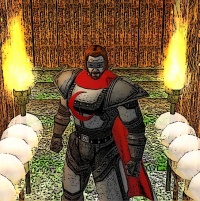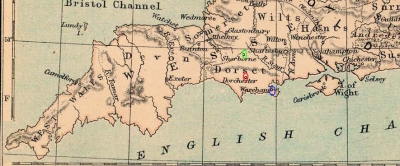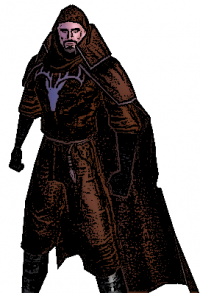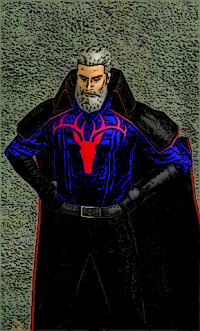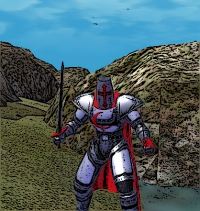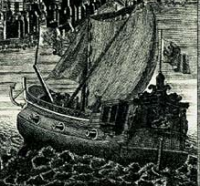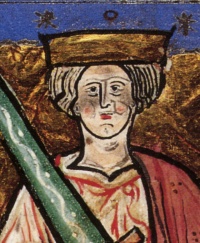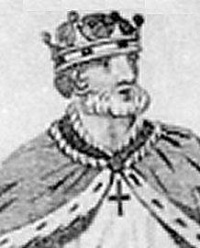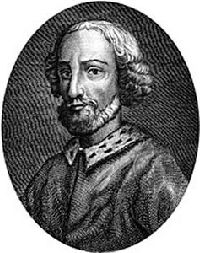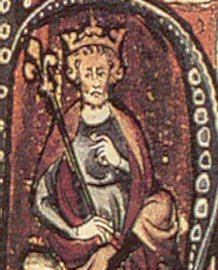Difference between revisions of "Nocturnal Crusader (Defiant)"
| Line 121: | Line 121: | ||
[[File:Edmond II d'Angleterre.jpg|top|right|thumb|200px|''(Eadmund):'' King Edmund II of England (Ironside) ''(Ref 2)'']] | [[File:Edmond II d'Angleterre.jpg|top|right|thumb|200px|''(Eadmund):'' King Edmund II of England (Ironside) ''(Ref 2)'']] | ||
| − | Before the messenger was told to leave, however, Sir Donald reached into his Gauntlet and pulled out | + | Before the messenger was told to leave, however, Sir Donald reached into his left Gauntlet and pulled out a purse. He opened it and gave the messenger 10 gold coins. Sir Donald placed the coins into the messengers hands and, while closing the messenger's fingers around the payment, told him to use the money to move himself, and any family, to Wareham. Once there he was to let himself be known to his guards at the castle gate and relate what had transpired here. They would then give him a further 40 gold coins from Sir Donald's treasury. Sir Donald saw the surprise on the messengers face and so explained why he was giving a messenger such a reward. He explained how his Grandfather had betrayed "those barbarians to the north", referring to the Scots. He told the messenger that his Grandfather had been a messenger to King Kenneth III of Scotland. King Æthelred II, the then King of England, had a spy approach this messenger called Percy McDonald and offered him, and his family, wealth and lands if he were to lead some of King Æthelred's men to the routes of which King Kenneth's messengers traveled. Percy agreed and lead King Æthelred's men to all the routes he new, assassinating messengers where they were seen and delivering the letters they carried to King Æthelred. |
This went on for 2 years before the assassins were finally captured in a trap set up by King Kenneth. Each of King Æthelred's assassins fought to the death but Percy, being only a messenger, had no training as a fighter and so ran, screaming at the top of his lungs "FOR SCOTLAND!" in his Gaelic language. | This went on for 2 years before the assassins were finally captured in a trap set up by King Kenneth. Each of King Æthelred's assassins fought to the death but Percy, being only a messenger, had no training as a fighter and so ran, screaming at the top of his lungs "FOR SCOTLAND!" in his Gaelic language. | ||
| Line 127: | Line 127: | ||
Upon hearing this account from his spies up in Scotland, King Æthelred was most pleased that King Kenneth was looking inside his own country for the leader of these assassins and so gave what was promised to Percy McDonald. | Upon hearing this account from his spies up in Scotland, King Æthelred was most pleased that King Kenneth was looking inside his own country for the leader of these assassins and so gave what was promised to Percy McDonald. | ||
| − | + | After hearing this tale of a daring messenger doing good for England and the King, the messenger took the money eagerly and promised that he would return immediately to his Lord to report in and then would go straight to his home, where he lived alone, pack all his belongings and head to Wareham and seek out the guard on the front gate of Sir Donald's Castle as he had been instructed. He thanked Sir Donald 3 more times before he eventually departed. As he walked away, with his back turned, Sir Donald looked to General Wolfe at his side and grinned. General Wolfe grinned back. This was an old game between them. | |
[[File:Kenneth III of Scotland.jpg|top|right|thumb|400px|''(Coinneach mac Dhuibh):'' King Kenneth III (The Chief/The Brown ''(An Donn)'' ''(Ref 3)'']] | [[File:Kenneth III of Scotland.jpg|top|right|thumb|400px|''(Coinneach mac Dhuibh):'' King Kenneth III (The Chief/The Brown ''(An Donn)'' ''(Ref 3)'']] | ||
| − | He would tell the story of his Grandfather so that the messenger would relax a little, knowing that Sir Donald's ancestry as a noble was only 2 generations. The fondness that Sir Donald put into his words when relating the tale made the poor souls believe that Sir Donald could love one | + | He would tell the story of his Grandfather so that the messenger would relax a little, knowing that Sir Donald's ancestry as a noble was only 2 generations old. The fondness that Sir Donald put into his words when relating the tale of his Grandfather made the poor souls believe that Sir Donald could have love for one as low as a mere peasant. The story itself was true. However, the emotion he put into his words when speaking of his Grandfather's history was not. When he had been told this exact same story by his father at the age of 10, it was told with nothing but hatred. "The only good things your Grandfather ever did" his father would tell him "was to take a heavy hand to me, pay for the best training and education possible and then not awake as I slit his throat in the night!" |
Of Course, when the messengers knocked on the gate of the castle, the guard there would welcome him as a brother and invite him inside, where the fool would then be trapped. This "game" was a good one. Not only did Sir Donald get a new slave, eventually even, maybe a new guard or soldier but, by allowing the messenger to travel home to get his belongings, hopefully, he would tell his friends and neighbours about his good fortune thanks to Sir Donald. This way, some of these friends and neighbours would also make their way to Wareham. If they did, they would always pretend to be a messenger and they to would be welcomed in. It was then up to Sir Donald whether these fools lived or be executed as liars to the Lord. The part about the 40 gold coins was no lie | Of Course, when the messengers knocked on the gate of the castle, the guard there would welcome him as a brother and invite him inside, where the fool would then be trapped. This "game" was a good one. Not only did Sir Donald get a new slave, eventually even, maybe a new guard or soldier but, by allowing the messenger to travel home to get his belongings, hopefully, he would tell his friends and neighbours about his good fortune thanks to Sir Donald. This way, some of these friends and neighbours would also make their way to Wareham. If they did, they would always pretend to be a messenger and they to would be welcomed in. It was then up to Sir Donald whether these fools lived or be executed as liars to the Lord. The part about the 40 gold coins was no lie | ||
Revision as of 01:52, 31 December 2009
| ||||||||||||||||||||
Contents
Overview
'Work in progress'
History
England 1098
The Crusades in Leon were grim indeed. The Church and England were losing the battle in the south west and all the armies of England sent there could not penetrate the vast bastions of the Turkish Muslims. One such army leader was Sir Bernard Richardson II (Duke of Sherborne), the favourite of King William II. Sir Bernard was in such dire need of help, for fear of losing the Kings trust, that he turned to the only man he thought strong enough to turn the tide in their favour. The Earl of Wareham, Sir Donald Buckholder III.
Sir Donald the Nocturnal (as he was known) was a man, and county, unto himself. So much so that even King William asked of him no taxes as any collector he sent there never returned.
Sir Donald’s prowess on the battlefields were second to none. Many times he was heard telling that he was the leader of armies, not of countries. This was, most probably, the only reason he never looked to usurping King William and taking the throne. He enjoyed pitting his wits against the greatest of enemies. For the thrill of the battle as well as the raping and pillaging.
Sir Bernard knew that Sir Donald was stationed at this time in his castle in Wareham as all ports at that time were far too busy for Sir Donald to ship out on another battle search. He sent a messenger (about the only people allowed into Wareham without fear of not returning) with a letter explaining the plight of his army in Leon. He promised Sir Donald in this letter, to remove all his troops from the area to allow Sir Donald the freedom of the land for him and his 1000 Nocturnals.
A week later, the messenger arrived back in Sherborne with an answering letter. Sir Donald told Sir Bernard that he would leave that very night for Southampton and to have 40 ships prepared and at his disposal to leave immediately. The letter finished, however, with:
"I ask that my payment not be made to me in gold or jewels. I demand, in return for this service I provide you, that all the land and all that is on it in Dorchester be mine upon my return. As you are aware, I take with me only few caravans and ten horses on my travels, hence we march on foot for Southampton, which I estimate to take me 3 weeks and 3 days to reach. If, when I arrive there, there are no parchments declaring the land be mine upon my return, I will turn my 1000 men around and march upon Sherborne to seize your land and all upon it under the banner of the Nocturnals.
Yours
Sir Donald Buckholder III"
This certainly surprised Sir Bernard some what for such a thing to be demanded. He knew full well that Sir Donald would not go to battle for the love of his country and was prepared to go to the King to ask for the amount that Sir Donald may ask for, declaring that the money be for his troops. That way there would have been no need for King William to be aware of this arrangement, as it was common knowledge that The King saw Sir Donald as a traitor to the country, and many other things besides. But to be told that he either give Sir Donald this land, which was not even his own, or forfeit his own land and estates? Either way, the news would have to be told to The King that either Dorchester or Sherborne was under the rule of one of his enemies. This was bad news indeed.
Sir Bernard left that very afternoon for Dorchester to see his cousin, the Earl of Dorchester, Sir James Richardson, to explain this unfortunate turn of events. It took Sir Bernard 6 days on horseback to reach his cousin and, upon arriving there he demanded an immediate audience with his Cousin, Sir James.
After explaining the situation to his cousin, Sir James was furious that Sir Bernard had made such a foolish mistake in asking for help from such a tyrant as Sir Donald. After calming down, however, he could see that the deed was done and could not be undone. He knew his cousin, Sir Bernard, was foolish and bull headed but did not want to see Sherborne ruled by such a man as Sir Donald. He also knew that Sir Donald now had his sights set upon expanding his land and it would not be long before he marched upon Dorchester and took that also, considering that Dorchester would then be in the middle of both Sir Donald's lands at that point. The options were then that they either legally pass over all deeds for the land of Dorchester or, deny Sir Donald the land of Dorchester and prepare for battle when Sir Donald had the power of both Wareham AND Sherborne. This aside, there was also the fact of losing favour with King William who would not look kindly upon civil war in the south of England when the Crusades were underway. All this and both Sir Bernard and himself would be turned out into the cold by The King for allowing such a matter to escalate to such a point in Leon, that a man, known to be his enemy, was asked for aid before The King knew anything about such matters.
Sir James bid Sir Bernard to stay the night at his castle and to give him some peace so as he could ponder over this predicament.
The following morning, Sir Bernard awoke from a terrible dream, in which his castle back in Sherborne had been laid siege upon by hundreds of blackened demons. Each with the symbol of the moon on its chest. Knowing this to be a dream did not douse his panicky breath however, as he knew that the dream was not that far from the truth if this problem with Sir Donald was not resolved in his favour. The only difference from his dream would be that the demons would be in human form with the symbol of the moon on their chests and would be lead by someone far more dangerous then the Devil himself.
After dressing, he made his way to the stables to attend his horse and then headed to the dining hall for breakfast wanting to further discuss the situation with his cousin. Hopefully, he thought, that would blow the troubling dreams from his head. He was therefore disappointed to find that he would be dining alone that morning. His fears worsened.
It was late afternoon by the time Sir James appeared in front of his cousin. He led him into his study and asked him to sit. Sir James gave Sir Bernard two envelopes, explaining that in the first, addressed to Sir Donald, was a letter signed and stamped in his name and coat of arms, proving it to be a genuine letter from himself. It was legal documentation giving Sir Donald Buckholder all the deeds to his land and everything in those boundaries upon the return of Sir Donald from Leon. The other envelope was addressed to General Abbott and Sir James explained to Sir Bernard that he was to read it now and then sign and stamp his own signature and coat of arms to it. Sir Bernard opened the unsealed envelope addressed to the General in charge of his own army in Leon. As he read further and further, his eyes became wider and wider.
Sir Bernard looked up at his cousin, still with the look of utter astonishment on his face. "Will this plan work?" he asked. "It has to!" replied Sir James.
The secret letter to General Abbott from Sir James was as follows:
"Dear General Abbott,
I am writing on behalf of my cousin, who I will be showing this letter to shortly, because of the fact he has foolishly made a pact with the Devil.
Roughly 3 weeks after you receive this letter, Sir Donald Buckholder III will be arriving at the docks there. He will believe that he carries with him a letter summoning you to retreat from the area and allow him, and his men, full access to that land for him to remove the problem of the Turks. However, please take this letter as your orders.
Upon his arrival, I ask that you act as if you are removing your troops to sail away, do not let on to even your most trusted and senior men of your true intentions at this point. You will march your men back to your ships, board them and set sail for England.
When you feel that you are far enough away that you can not be seen even by the most advanced of telescopes,at a guess I would predict that to be around 3 days travel, weather permitting, I want you to make a full turnabout and head to a safe and secretive position for your ships that you will locate in the 3 weeks you have left before his arrival.
After 4 days waiting, as this should be a week since the arrival of our problematic friend and enough time should have passed for them to be far enough away from the docks to know of the next stage of our plan, I ask that you send as many men as you see fit to commandeer their ships and have them head home to England.
A letter is already on route to my very own general in the field over there, General Oaks, as I write this letter and so will be aware of what is to follow before your good self. He will have no contact with Sir Donald as you will and so I have to be less secretive in getting the letter to him as I do you.
He will have a scout at the docks watching for when you commandeer Sir Donald's ships and, when this has occurred, my General and men will head towards the forts of our troublesome Turks and check on Sir Donald's progress. Once Sir Donald is done and starts heading back to his ships, General Oaks will follow at a safe distance.
My plan, therefore, is for you to attack with everything you have from the North of Iberia and for my men to attack in a pincer movement from the South.
I understand that you will be dubious upon hearing my plan but I'm afraid that this is indeed a dire situation. If you make it out alive but defeated, then please do not return home. There will be no home for you to return to as Sir Donald will own it all.
Yours Faithfully
For King William II, God and Country
Sir James Richardson
Sir James explained to his cousin that another messenger was prepared at the stables to take this letter all the way to Leon, Sir Bernard signed the letter and then, with his ring, stamp sealed the envelope with hot wax. Sir James then told Sir Bernard to write his own letter to General Abbott and have it sent to the docks to await the arrival of Sir Donald. This letter would tell General Abbott to remove his troops from Leon and allow Sir Donald to take charge. The plan seemed like a good one, but this was no ordinary man they were dealing with. This was the man who had broken the spirits, and necks, of highly trained samurai in the Orient just because he found their women more attractive then those at home. The man whose very name brought fear into men's, and women's, hearts and souls all across Europe. The man who had marched his men from one side of France to the other, raping and pillaging as he went, without a single French soldier raising a hand for fear of attracting his wrath.
And so, the plan was set, the letters that needed sending sent. All else rested on the plan fitting together.
Southampton, England 1098
Just as Sir Donald had predicted, he and his men arrived at the docks in Southampton after 3 weeks and 3 days of marching. After halting his 1000 men just outside the docks, Sir Donald and his General, Wolfe, made their way to find the dock master. Sir Donald and his men marching anywhere could not go unnoticed. Scouts were seen all along Sir Donald's march. If he had been marching to battle and the scouts were sent by his enemy, no scout would have lived long enough to report back.
As such, the dock master was already awaiting them. He explained to Sir Donald where his 40 ships were moored and sent for the messenger who had the letters from Sir Bernard and Sir James. Sir Donald opened the letter from Sir James first. The messenger, although he knew himself to be safe if the letter contained bad news (Sir Donald, once again, was known for his allowance of messengers), still felt apprehensive as to the reaction of Sir Donald. It was hard, however, to read the mans face. He, like all his men, wore a metal ring around the top half of his face, with only 2 crosses for him to see out of. Even with these crosses, you could never see the eyes as there was black stained glass protecting them. What gave it an even more sinister look was, with the light of the moon reflecting off the glass, it gave the impression that his eyes were aglow. All this would have looked crude but for the wool that had been attached to the outside of this metal band. It was obviously there to stop the metal from sitting too sharply upon the skin, but gave the face guard a majestic look.
While Sir Donald read the letter from Sir James, the messenger took in the whole of the man. Standing at over 7 feet tall, to which his posture granted even more height, it was clear that Sir Donald trained hard and frequently for, even with all his armour on, you could see the muscle was well toned. His armour consisted of a neck guard sitting loosely on his breast and abdomen plait which covered his body chain mail. 2 large metal shoulder pads, armour on the tops of his arms, which was also covering chain mail, and large gauntlets which came up to his elbows. Around his waist he wore a large studded leather belt which was attached to his cod piece. Upper leg and lower leg armour once again covering the chain mail and 2 large boots made of leather with metal coverings. All the armour was of a light silver with dark silver on the trims and chain mail. Upon
his chest was his coat of arms, a simple, blood red quarter moon. Upon his back, and draped around his shoulders, a red cape with the cape itself designed to look like a Celtic cross but in the style of the English flag (Saint George). This last was the banner of his Grandfather, it marked the fact that his Grandfather was of Scottish heritage. He was once known as Percy McDonald but had betrayed his country for the then King of England, Æthelred II. For his betrayal, Percy McDonald (Known as Percy the Betrayer by the Scottish) was given wealth and land (Wareham). His name was changed from Percy McDonald to Donald Buckholder (Buckholder due to his banner of a Stag and an open hand in the background whilst he was a Scottish Noble). His new banner was also given to him by King Æthelred II, a Celtic cross in the style of the English flag to mock the Scots. This mockery was not lost on the Percy (Donald I) and, when King Æthelred II's second reign as sovereign ended with his death in 1016 and with his son, Son King Edmund, only lasting just over 7 months, Cnut I, or Cnut the Great, began his reign. At this point Sir Donald Buckholder I changed the banner to the blood quarter moon to mark the new King's reign and the birth of his son, Donald Buckholder II, in honour to the blood moon that had risen that night on the 1st of December, 1016.
All this was impressive enough, but it was above his neck that was the true strength to his Devilish appearance and, thus, his legacy. Sir Donald had shocking red hair down to his jaw where it met with a close trimmed beard of the same colour. In contrast to this, his skin was the colour of milk. Many thought this to be the sign that he was brought forth from the very night itself, where no sunlight could penetrate. The truth was he was born with a very rare disorder which made Sir Donald unable to bear his skin, or of course his eyes, to any kind of light. So much so that even the light from the moon hurt his eyes without the aid of the black stained glass in his face guard. This fact was only known to his father (now deceased), his Doctor (safely under guard at his castle) and himself.
The messengers intake of this flamed haired giant was interrupted by Sir Donald grunting, he hoped in approval, and folding the letter. The messenger hadn't noticed until now the complete lack of movement of the man as he had been reading the letter. There had been no foot adjustment, flinch or tick to his entire body during the whole reading process. This, if not for the look of the man alone, proved what a well trained warrior this man was. Sir Donald put the deeds he had just folded down the front of his breast plate and proceeded to open the letter addressed to General Oaks. No care was taken in doing so, he simply tore at the envelope, breaking the waxen seal of Sir Bernard. The Messenger new that this disregard for another mans sealed letter had to be reported to the sender. But then, he had been told to give this letter to Sir Donald to take on his journey instead of, himself, traveling to the recipient to give the letter in hand. He thought it wise, however, to say nothing to Sir Donald about the action of opening another mans letter, but instead to report it back to his Lord upon his return.
Again, there was no movement until he had finished this letter and even barked a laugh (the messenger new this to be a VERY rare thing indeed). Upon seeing the expression on the messengers face, Sir Donald turned the letter around for the messenger to see. "He has put his waxen stamp INSIDE the letter. He knew I would open it immediately. It seems there is little trust for my good self from your Master". Again, he barked a laugh, folded this letter and put it under his breast plate along with the other. The messenger new better then to correct him on his usage of the word "Master". He was no slave and so Sir Donald should have referred to Sir Bernard as his "Lord". The messenger, although again he knew he was safe from this man, knew better then to push his luck.
Before the messenger was told to leave, however, Sir Donald reached into his left Gauntlet and pulled out a purse. He opened it and gave the messenger 10 gold coins. Sir Donald placed the coins into the messengers hands and, while closing the messenger's fingers around the payment, told him to use the money to move himself, and any family, to Wareham. Once there he was to let himself be known to his guards at the castle gate and relate what had transpired here. They would then give him a further 40 gold coins from Sir Donald's treasury. Sir Donald saw the surprise on the messengers face and so explained why he was giving a messenger such a reward. He explained how his Grandfather had betrayed "those barbarians to the north", referring to the Scots. He told the messenger that his Grandfather had been a messenger to King Kenneth III of Scotland. King Æthelred II, the then King of England, had a spy approach this messenger called Percy McDonald and offered him, and his family, wealth and lands if he were to lead some of King Æthelred's men to the routes of which King Kenneth's messengers traveled. Percy agreed and lead King Æthelred's men to all the routes he new, assassinating messengers where they were seen and delivering the letters they carried to King Æthelred.
This went on for 2 years before the assassins were finally captured in a trap set up by King Kenneth. Each of King Æthelred's assassins fought to the death but Percy, being only a messenger, had no training as a fighter and so ran, screaming at the top of his lungs "FOR SCOTLAND!" in his Gaelic language.
Upon hearing this account from his spies up in Scotland, King Æthelred was most pleased that King Kenneth was looking inside his own country for the leader of these assassins and so gave what was promised to Percy McDonald.
After hearing this tale of a daring messenger doing good for England and the King, the messenger took the money eagerly and promised that he would return immediately to his Lord to report in and then would go straight to his home, where he lived alone, pack all his belongings and head to Wareham and seek out the guard on the front gate of Sir Donald's Castle as he had been instructed. He thanked Sir Donald 3 more times before he eventually departed. As he walked away, with his back turned, Sir Donald looked to General Wolfe at his side and grinned. General Wolfe grinned back. This was an old game between them.
He would tell the story of his Grandfather so that the messenger would relax a little, knowing that Sir Donald's ancestry as a noble was only 2 generations old. The fondness that Sir Donald put into his words when relating the tale of his Grandfather made the poor souls believe that Sir Donald could have love for one as low as a mere peasant. The story itself was true. However, the emotion he put into his words when speaking of his Grandfather's history was not. When he had been told this exact same story by his father at the age of 10, it was told with nothing but hatred. "The only good things your Grandfather ever did" his father would tell him "was to take a heavy hand to me, pay for the best training and education possible and then not awake as I slit his throat in the night!"
Of Course, when the messengers knocked on the gate of the castle, the guard there would welcome him as a brother and invite him inside, where the fool would then be trapped. This "game" was a good one. Not only did Sir Donald get a new slave, eventually even, maybe a new guard or soldier but, by allowing the messenger to travel home to get his belongings, hopefully, he would tell his friends and neighbours about his good fortune thanks to Sir Donald. This way, some of these friends and neighbours would also make their way to Wareham. If they did, they would always pretend to be a messenger and they to would be welcomed in. It was then up to Sir Donald whether these fools lived or be executed as liars to the Lord. The part about the 40 gold coins was no lie either. The mans first job as Sir Donald's new slave would be to polish each and every item of worth in his treasury. This meant polishing each coin individually. This was the first of many tests that every one of his soldiers and staff were given, this being the most lenient. No man was executed for not finishing this task, it was simply to test his will and pain threshold. Of Course, he would be beat to within an each of his life but Sir Donald trusted each and every one of his Home Guard to not go over that limit to which the man died. IF they did, and that was a big IF, they would then have to sacrifice their own lives or be put through torture worse then any that the new men received. It was a shame, he thought however, that this messenger had no wife or daughters. He was getting bored of the women he kept for bedding.
The dock master, as the messenger had heard all the tales of Sir Donald being the either son of the night or the spawn of the Devil plus other references to Sir Donald somehow being part demon. Seeing the man in the flesh had given him goosebumps, admittedly, but only because of the shear force the man exhumed. But, when he saw the grin his shared with his General, the Dock masters skin almost turned as white as Sir Donald's. There was nothing but pure malice and evil in that grin and the dock master feared for the life of the messenger, not matter the assurances of everyone that no messenger was killed by Sir Donald or any of his men. The dock master wondered whether to politely cough to remind Sir Donald that he was still there but, no sooner had the thought finished in his, then Sir Donald's head snapped around to look at him. The dock master felt as if he'd been caught in the act of a terrible deed and, even though Sir Donald's eyes were masked, the dock master felt as if Sir Donald's eyes were burning into his very soul.
Sir Donald assured the dock master that he had not forgotten him (this, of course, lead to the dock master telling all he met after this meeting that Sir Donald could also read minds) and if there was a problem? Again (this also fueling to his belief that Sir Donald could read minds as he had JUST been thinking about the welfare of the messenger). "N .... N .. No, m ...my Lord" he replied to which Sir Donald told the dock master to stop stammering then and clear the dock for his troops to enter. The dock master turned on his heal and made haste to do as he was told, glad to be away from that unseen, penetrating stare.
The dock was cleared in 10 minutes flat and, when he reported the back to Sir Donald, General Wolfe pursed his lips and gave a loud high pitched whistle. Not 5 seconds later, the sound of 1000 men could be heard heading towards the docks.
Sir Donald, General Wolfe, the 10 horses and caravans and all 1000 Nocturnals were aboard their 40 ships. It had taken less then 1 hour for this to happen, which was impressive for 1000 men. The captains called for the ropes to be let lose, raised anchor and set sail for Iberia. When the boats were nothing but dots where the sea met the night sky, the dock master fainted.
Iberia 1099
'Work in progress'
Note from the author
I have taken some liberties with the dates and events during this period in order to better tell the story. If you feel that some information provided is inaccurate or to exaggerated, please don't hesitate in adding to the discussion page with the real facts with links. I hope you enjoyed the story and thank you for taking the time to read it.
Regards
The Fish
References
1: Map Archives
2: Wikipedia, Kings of England
3: Wikipedia Kings of Scotland

